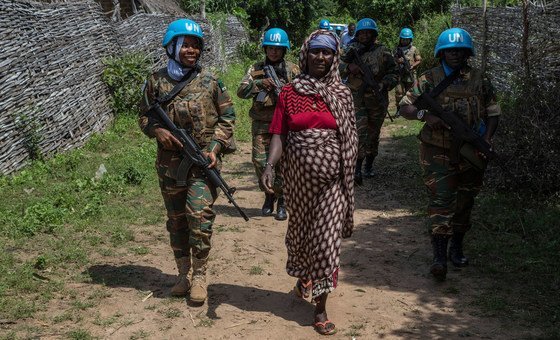
In 2022, Baah was one of the 173 Ghanaian women peacekeepers who served in the UN Interim Mission in Lebanon. She was also one of the 6,200 uniformed women peacekeepers – military and police personnel – serving in the world’s 12 peacekeeping missions which are mostly in Africa (6) and the Middle East (3).
These women are often seen as a beacon of hope and protection for millions of civilians, many of them women and girls, who are struggling to keep safe while helping to rebuild their lives and communities after wars.

Captain Baah (right) visits a Lebanese family in Southern Lebanon.
“There are some in the town who are not very comfortable with an unknown man talking to their females so, because I am a woman, I am able to approach any female, in any town, because they see me as a woman and I am not a threat,” says Captain Baah.
Gender parity in peacekeeping, especially among its leaders and uniformed personnel, has long been a priority for the United Nations. The organization, which depends on its member countries to provide military and police contingents, has launched several initiatives over the years, including urging and incentivizing troop-and-police-contributing countries to deploy more women peacekeepers.
“The world will be a better place with gender equality. We should, therefore, continue to challenge gender stereotypes, call out discrimination, draw attention to biases and seek out inclusion,” says Ghanian Commodore Faustina Anokye, the Deputy Force Commander of the UN Mission for the Referendum in Western Sahara.
Over the years, some progress has been made. Between 1957 and 1989, there were only 20 uniformed women in peacekeeping. As of September 2023, there were 6,200. But progress has been slow and particularly low among the military contingents. Out of the more than 70,000 uniformed peacekeepers, less than 10 percent are women.
More than half of these women are from Africa. Among the over 120 countries that contribute both troops and police, Egypt, Ethiopia, Ghana, Rwanda, Senegal, South Africa and Zambia are some of Africa’s largest contributors of uniformed women peacekeepers today.
Pioneers and trailblazers
“Together, with all the other women pioneers, we have a responsibility to carry the torch and break down the gender stereotypes, prejudices and barriers against women in the field of corrections and security,” says Téné Maïmouna Zoungrana, a corrections officer from Burkina Faso who served in MINUSCA, the UN peacekeeping mission in the Central African Republic.
Zoungrana was awarded the first-ever UN Trailblazer Award for Women Justice and Corrections Officers in 2022. Working under MINUSCA’s mandate to help build-up the national capacity to maintain law and order, she was instrumental in creating an all-women rapid intervention team, and recruiting and training local prison officers at the Ngaragba Central Prison – considered the largest and the most notorious prison in Bangui.

Téné Maimouna Zoungrana is a corrections officer from Burkina Faso serving with the UN Mission in the Central African Republic (MINUSCA).
“In my professional environment, the field of security, women are often placed second or even ignored, because of stereotypical perceptions that men are better suited for the job. I had the courage and strength, and vocation, to break down barriers and assert myself confidently in this field,” adds Ms. Zoungrana.
Women peacekeepers like Téné Maïmouna Zoungrana act as role models for many women and girls. Her work helps to break down traditional gender barriers, and motivates and empowers local women to build their confidence by taking on non-traditional roles monopolized by men in the security sector.
Peacekeepers also play a critical role in putting in place gender-sensitive outreach programmes designed specifically to cater to the unique needs of women and girls.
Military Gender Advisor Steplyne Nyaboga from Kenya, won the UN Military Gender Advocate of the Year award in 2020. She trained a military contingent of more than 15,000 troops, who served in the UN Mission in Darfur (now closed), on gender dynamics and strengthened the mission’s engagement with Darfuri women.
“Peacekeeping is a human enterprise: placing women and girls at the center of our efforts and concerns will help us better protect civilians and build a more sustainable peace,” she says.
Over the decades, international norms and conventions have been adopted to include women in peace processes – to make sure women are represented in peace negotiations, support women civil society organizations and address the gender imbalance among decision-makers that continues to exist today.
In 2019, the Elise Initiative Fund, hosted by UN Women, was established to provide countries with financial incentives and support to increase the number of uniformed women peacekeepers.
By 2022, it had invested $17 million to support 21 national security institutions, including in Uganda, Senegal and Ghana, and two peacekeeping operations including MINUSMA in Mali.

Senegalese and Nigerian UN police officers attend an Elise Initiative Fund-sponsored training with Malian police officers in Bamako, Mali.
“It is now time to live up to those commitments. We need to bring the voices of women to the negotiation table in political and peace processes. We must empower them through capacity-building and provide the support they need to be heard. This is a must for sustaining peace,” says the UN Assistant Secretary-General for Africa Martha Ama Akyaa Pobee.
On the ground, the indispensable work of women peacekeepers continues to make a major impact especially in the lives of local women and girls.

Women in Peacekeeping
